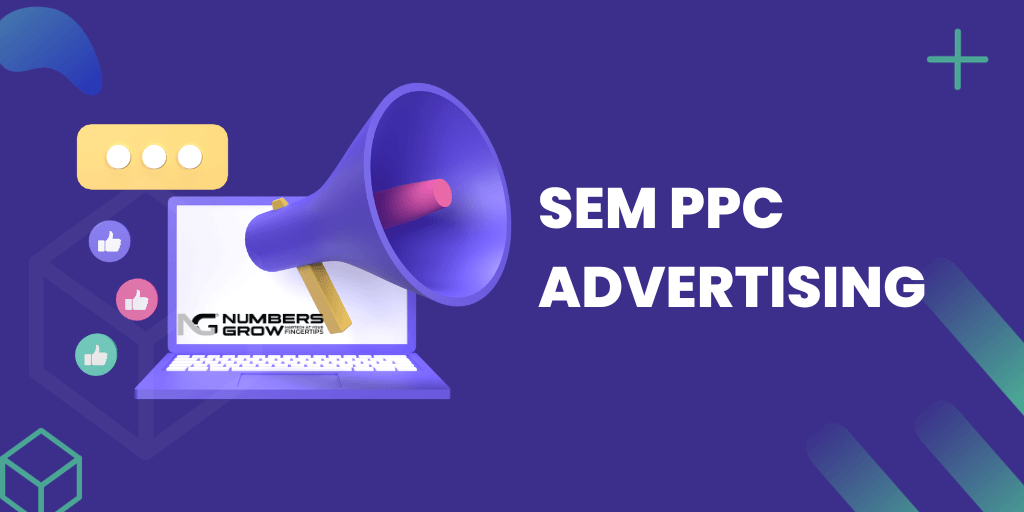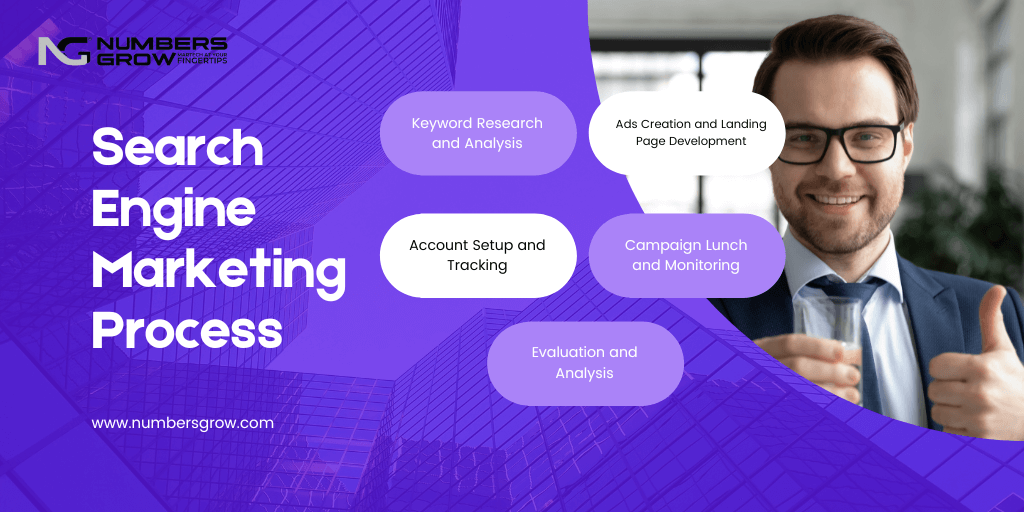Search Engine Marketing (SEM)
- Home
- Search Engine Marketing (SEM)

What is SEM and Why It’s a Great Investment.
In today’s highly competitive digital landscape, search engines have become essential tools across various industries and sectors, such as digital marketing, healthcare, education, and eCommerce. Functioning as customer service utilities, these search engines enable online users to access a wide array of information online, including news, blog posts, and product offerings, facilitating informed decision-making.
Moreover, they serve as potent marketing platforms for businesses to enhance their online presence and bolster brand awareness.
Search Engine Marketing (SEM) is a crucial strategy for anyone with a website looking to promote their products and services and establish connections with crucial stakeholders. While you may be familiar with search engines in the context of Search Engine Optimization (SEO) strategies, understanding their role in search engine marketing is equally important.
Suppose you’re eager to kickstart your SEM advertising campaign. In that case, our search engine marketing agency can guide you through the significance of search engines in SEM and demonstrate how your business can leverage them to streamline your customers’ purchasing journey. Gain insights into search engine advertising to enhance your marketing effectiveness quickly!
What Is Search Engine Marketing?
Research indicates that around 85 per cent of consumers engage in online research, spending an average of 75 days gathering information about a product or service before making significant purchases. A substantial majority of online users exhibit a solid intent to purchase.
Search engine advertising emerges as an exceptionally cost-effective method to connect your brand with consumers actively seeking information and preparing to purchase. SEM advertising capitalizes on users’ online behaviour, strategically placing your ads precisely when they are searching for your brand offerings and are in the purchasing mindset.
Search Engine Marketing (SEM) is a pay-per-click (PPC) advertising strategy designed to enhance your website’s visibility in Search Engine Results Pages (SERPs) and engage customers throughout the entire buying cycle. Our search engine marketing experts engage in keyword bidding to optimize your ad performance, elevate your Quality Score, and drive increased traffic and conversions to your landing pages. Search engines use Quality Score to assess the quality and relevance of your paid search ads. By effectively addressing the needs of your prospects, you reduce the cost search engines charge for each ad click and conversion.
How Does SEM Work?

Search engines employ algorithms to assess and rank SEM ads, gauging their relevance in search results. Paid search engine marketing hinges on crafting an effective strategy, bidding on valuable keywords, and consistently refining advertising tactics using analytics data. The goal is to reduce ad spending while enhancing profitability.
To surpass your competitors, our search engine marketing agency adopts a systematic approach to search advertising:
- Keyword Research and Analysis
Our SEM company employs advanced keyword research tools, such as Google Search Console, to pinpoint high-performing search terms. We meticulously eliminate negative keywords that don’t effectively utilize your search advertising budget. - Ads Creation and Landing Page Development.
Once we identify your target keywords, our search engine marketing experts craft text-based ads for display in search results. These ads are strategically linked to unique, optimized landing pages to capture your target audience’s initial search intent and guide them through your sales funnel. - Account Setup and Tracking
This phase is pivotal for understanding the effectiveness of your search engine marketing strategy. Our SEM firm conducts a lead-tracking report to check if the search engine supports conversion tracking. If supported, we ensure the proper installation of tracking codes on your landing pages. - Campaign Launch and Monitoring
With optimized paid search marketing ads, well-designed landing pages, and a robust search engine marketing strategy, your PPC search engine marketing campaign is nearly ready for launch. Our SEM agency manages campaign settings, including locations, languages, networks, and devices. Once launched, we closely monitor ad performance. - Evaluation and Analysis
Benchmarking campaign results against your paid search marketing goals is crucial for measuring SEM success. We track and evaluate key performance indicators (KPIs) such as click-through rate (CTR), Quality Score, search impression share, and cost per conversion. Analytics results empower us to optimize subsequent paid search engine marketing campaigns for enhanced conversions.
Now that you understand search engine marketing and its operation, the next step is assessing whether SEM PPC is worthwhile. Allow our SEM company to guide you through the advantages of early capitalization on search engine marketing.
Unlocking Business Success.
Enhanced Brand Visibility
Utilizing Internet search engine marketing empowers you to select and bid on highly relevant keywords aligning with your customers' search intent. Furthermore, Google SEM allows you to incorporate your brand name into the ad's headline, display URL, description, and extension link. These strategies enhance the likelihood of achieving prominent positions in Google search results, elevate brand awareness, and swiftly bring visibility to your products and services.
Heightened Conversion Rates
A significant advantage of Google SEM ads lies in their capacity to deliver swift results and ensure a rapid return on investment (ROI). Effective search engine marketing solutions enable you to generate new sales and conversions on the same day. It's important to note that consistent Google search advertising and periodic campaign adjustments are vital to sustain year-over-year growth.
Precise Audience Targeting
Current statistics reveal over 30.6 billion Google searches each month, and a staggering 99.9 per cent of these global searches may need to align with your audience targeting strategy. Through SEM PPC, you can harness diverse targeting options, including geo-targeting, ad scheduling, and device targeting, to enhance your ad performance and guarantee that your Google SEM campaign appears in the most relevant and impactful locations.
Enhanced Campaign Management
SEM digital marketing simplifies the oversight of your advertising budget, campaign reach, and brand messaging. In contrast to SEO, where search engines dictate the presentation of organic search results, Google search advertising grants you control over your calls-to-action (CTAs), ad schedule, audience targeting, and other elements of your Google SEM ads.
Quantifiable Advancement
Internet search engine marketing provides the means to evaluate your ads' performance and assess each campaign's outcomes. With comprehensive analytics and campaign data, you can pinpoint which ads yield the highest conversion rates for your company, considering metrics such as click-through rate (CTR), clicks, impressions, and more.
Enhanced Organic Traffic
Studies indicate that over 93 per cent of online experiences commence with a search engine. Achieving higher search visibility situates your brand in the prime locations where most of your customers initiate their online journeys. Understanding the significance of SEM and utilizing it to your advantage enables you to channel high-quality traffic from search engines to your website.
Search Engine Marketing FAQs
While SEO (Search Engine Optimization) focuses on optimizing a website to improve its organic search ranking, SEM involves paid advertising to achieve immediate visibility in search results. SEO is a long-term strategy, while SEM provides quicker results.
SEM campaigns involve creating targeted ads and bidding on relevant keywords. Ads are displayed in search results when users search for specific keywords related to the products or services the business offers. Advertisers pay for clicks or impressions, depending on the chosen advertising model.
Yes, SEM is suitable for businesses of all sizes. It allows small businesses to compete with larger ones on a level playing field, as they can target specific audiences and set budgets according to their resources.
Remarketing, or retargeting, is a strategy where ads are shown to users who have previously visited a website but have yet to convert. This helps re-engage potential customers and increase the likelihood of conversions.
SEM is crucial for businesses looking to increase online visibility, reach a targeted audience, and drive relevant website traffic. It offers a measurable and cost-effective way to promote products or services and achieve specific marketing goals.
Google Ads is the most popular platform for SEM. Still, other platforms such as Bing Ads and social media advertising on platforms like Facebook and Instagram also contribute to a comprehensive SEM strategy.
Success in SEM is measured through key performance indicators (KPIs) such as click-through rate (CTR), conversion rate, cost per click (CPC), and return on investment (ROI). Regular monitoring, analysis, and adjustments are essential for optimizing campaign performance.
Keyword research is a crucial step in SEM. The right keywords are chosen based on relevance to the business, search volume, and competition. Long-tail keywords and a well-structured keyword strategy are often employed for better targeting.


